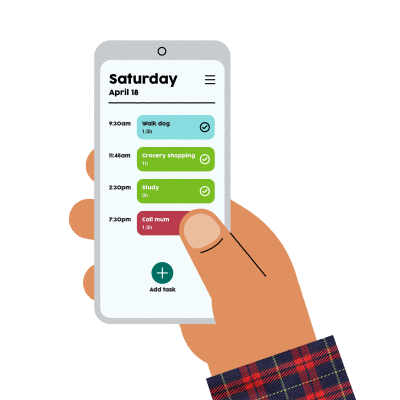If you have less than $150 in your savings before you next get paid, you might need to look at your budget. $150 is a good amount to have in case something unexpected happens.
Increase your income
- Are there extra shifts you can pick up at work? Are you getting paid the correct amount? Is your tax and super being calculated correctly?
- Can you get additional training at work or do a course to build your skills and experience, so that you can increase your income?
- Have you thought about having a garage sale or selling your vintage clothing collection on Facebook marketplace?
- Doing the stuff you love is good for your wellbeing, as it gives you a sense of accomplishment, purpose and connection. Can you start your own small business by getting paid for your hobbies or interests? Things like dog walking, painting, editing online articles…. The list is endless! Check out how to register a business at business.gov.au
- Are you entitled to any Centrelink payments or Government concessions? For the most up-to-date information, check out Services Australia.
Decrease your expenses
- Have a look at your personal spending, what are you spending your money on? Look at the big expenses.
- Can you walk to work or use public transport instead of Uber or driving? Look at the Motor Mouth App, which finds the cheapest petrol near you.
- Getting exercise is good for all of us. Can you set up a gym at home or go for a run at your local park, instead of paying for a monthly gym membership? Also gyms vary in price depending on facilities - check to see if a gym close by offers what you use at a lower price.
- You could try cooking your own meals instead of eating out – a nutritious home cooked diet can also help you feel better, as there is a strong link between what you eat and how you feel. Groupon have great meal deals or check out our healthy digital recipe cards.
- Check your bank fees. You might be paying monthly account keeping fees which add up very quickly. Speak with you bank and see what other options they have (most now have fee-free accounts).
- Find promo codes or free trials where possible to save money. Remember to check when the free trial finishes.
- If you’re buying something online, check if you can buy it in-store first to save on shipping fees.
- Check your utility discounts – often when you pay on time, you can receive a discount.
“Buy Now, Pay Later” – yes you will pay later
These are services which allow you to get the goods now and pay for them later (usually interest free). Sounds great right? And it can be, until you fail to meet the repayments.
- Don’t over-commit yourself and leave yourself short of money
- Late payment incurs fees which can add hundreds onto your balance
- Other banks may consider this type of spending negatively if you are applying for a loan
- Missed / late payments may appear on your credit report
Credit Cards & Personal Loans
These can be good options to help with buying your first car or in case of emergencies. But missed / late payments can have consequences like fees and interest charges.
- Always check your interest rate and charges associated with non-payment
- Shop around for the lowest interest rate and annual fee
- Non-payment will mean your credit report is affected
- Make sure you budget for the repayments, and try to opt in for the direct debit payment option so you don’t forget!
mind & money
Back to main page
Disclaimer
The information in this document is for general information only. It should not be taken as constituting professional advice from the issuer, headspace National Youth Mental Health Foundation Ltd (“headspace”). headspace is not a financial adviser. You should consider seeking independent legal, financial, taxation or other advice to check how the information in this document relates to your unique circumstances. headspace is not liable for any loss caused, whether due to negligence or otherwise arising from the use of, or reliance on, the information provided directly or indirectly, by use of the information set out in this document.
Get professional support
If you feel you need help there are a range of ways we can support you.

